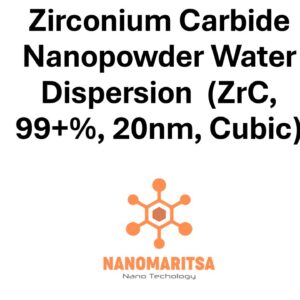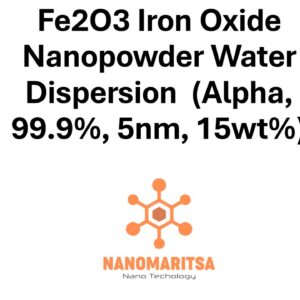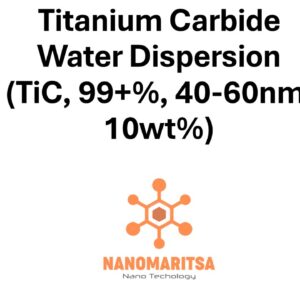Metal Oxide Dispersions
Aluminum Oxide Nanopowder Water Dispersion (Al2O3,Gamma, 20wt%, 10nm)
€50.00
CompareAluminum Oxide Nanopowder Water Dispersion (Al₂O₃, Gamma, 20 wt%, 10 nm) is a suspension of gamma-phase aluminum oxide nanoparticles in water. Here’s a detailed explanation of its composition, properties, and applications:
1. Composition:
- Aluminum Oxide (Al₂O₃):
- A widely used ceramic material with excellent thermal and mechanical properties.
- Gamma Phase:
- The gamma phase (γ) of Al₂O₃ is a metastable phase known for its:
- High surface area.
- Porosity, making it suitable for applications like catalysis and adsorption.
- Compared to the stable alpha phase, gamma Al₂O₃ is less dense but chemically active.
- The gamma phase (γ) of Al₂O₃ is a metastable phase known for its:
- Nanoparticles (10 nm):
- Ultra-fine particles with an average diameter of 10 nanometers (nm).
- High surface area due to the nano size, enhancing reactivity and performance.
- 20 wt%:
- 20% by weight of the dispersion consists of Al₂O₃ nanoparticles, while the remaining 80% is water.
- Water Dispersion:
- The particles are uniformly dispersed in water, ready for application.
2. Key Properties:
- Nano Scale:
- Particles with 10 nm diameter provide a very high surface area, making them ideal for surface-dependent applications.
- Gamma Phase Characteristics:
- High reactivity.
- Excellent adsorptive and catalytic properties.
- Water-Based Dispersion:
- Environmentally friendly and safe to handle compared to organic solvent dispersions.
- Thermal Stability:
- Gamma-phase Al₂O₃ is stable at moderate temperatures but transitions to the alpha phase at higher temperatures (~900–1100°C).
- High Surface Energy:
- Suitable for surface modification, coatings, or integration into composite materials.
3. Applications:
- Catalysis:
- Acts as a catalyst or catalyst support in chemical reactions, such as hydrocracking, reforming, and pollutant removal.
- Adsorption:
- Used for water purification, gas separation, and dehumidification due to its high surface area and porosity.
- Coatings:
- Forms protective or functional coatings with excellent adhesion and thermal resistance.
- Polishing:
- As an abrasive in ultra-fine polishing processes for semiconductors, optics, and metals.
- Composites:
- Enhances mechanical strength, thermal stability, and wear resistance in polymer, ceramic, or metal composites.
- Electronics:
- As a dielectric material or thermal insulator in electronic devices.
- Thermal Management:
- Used in heat-resistant coatings or thermal interface materials.
4. Advantages:
- High Surface Area:
- Enhanced performance in catalytic and adsorption applications.
- Easy to Use:
- Pre-dispersed in water for uniform application, eliminating the need for manual mixing.
- Environmentally Friendly:
- Water-based formulation avoids hazardous organic solvents.
- Chemical Reactivity:
- The gamma phase’s higher reactivity compared to the alpha phase is ideal for dynamic environments.
5. Handling and Storage:
- Handling:
- Shake or stir thoroughly before use to ensure uniform nanoparticle distribution.
- Avoid prolonged exposure to air, which may cause sedimentation or contamination.
- Storage:
- Store in a cool, dry place, avoiding freezing or excessive heat to maintain dispersion stability.
- Safety:
- Use gloves and protective equipment to avoid contact with skin or eyes.
SKU: MN07NPD0102
Category: Metal Oxide Dispersions
| Measurement (ml) | 100 ml, 500 ml, 1000 ml |
|---|
Related products
-
Metal Oxide Dispersions
Titanium Oxide Nanopowder Water Dispersion (TiO2, Rutile, 15 wt%, 5-30 nm)
0 out of 5(0)SKU: MN07NPD0106€60.00 This product has multiple variants. The options may be chosen on the product page -
Metal Oxide Dispersions
Zirconium Carbide Nanopowder Water Dispersion (ZrC, 99+%, 20nm, Cubic)
0 out of 5(0)SKU: MN07NPD0119€90.00 This product has multiple variants. The options may be chosen on the product page -
Metal Oxide Dispersions
Fe2O3 Iron Oxide Nanopowder Water Dispersion (Alpha, 99.9%, 5nm, 15wt%)
0 out of 5(0)SKU: MN07NPD0120€280.00 This product has multiple variants. The options may be chosen on the product page -
Metal Oxide Dispersions
Titanium Carbide Water Dispersion (TiC, 99+%, 40-60nm, 10wt%)
0 out of 5(0)SKU: MN07NPD0118€90.00 This product has multiple variants. The options may be chosen on the product page






